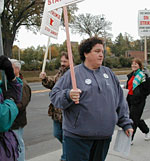Ventura threatens layoffs
By Michael Khoo
Minnesota Public Radio
October 5, 2001 As many as 22,000 state workers remain on the picket lines with no new talks scheduled and little prospect for a quick resolution to contract negotiations. Gov. Ventura, who has maintained a low profile up to and during the strike, is repeating his warning that the state simply doesn't have additional resources to put on the table; union members believe otherwise.
| |
|
|
|
||
"I can tell you personally, I would be going to work," he said. "If I had a job and at this point and time - and I'm only speaking for myself - that I would be going to work because it's a tough time. You know, we're going to war in my opinion. And in war, everyone has to bite the bullet a little bit."
Union members, however, bristled at the suggestion they should simply accept the state's offer and report to their jobs. Eric Kilberg, works for the Minnesota Pollution Control Agency, was one of roughly a dozen other striking workers waited outside the radio station for a chance to engage the governor. Kilberg says state employees will return only when they have "a fair contract."
"He could be a little more forthright. And I think they need to come back; they need to treat us fairly. Y This is not dad giving us an allowance. It's us negotiating. And we have the right to negotiate for a salary that's good," Kilberg said.
But Ventura says the state's most recent offer is not only fair, it's the best the state can afford. The governor says to offer heftier wage or benefit packages would require cutbacks in state services, including the elimination of some jobs.
"I will not raise taxes to fit in whatever compensation package we end up with. So some of these very people who are striking for the more money are at risk of losing their jobs because we will be downsizing accordingly," Ventura said.
The state has offered members of the American Federation of State, County, and Municipal Employees, Council 6, three-percent wage increases in each of the next two years. AFSCME is seeking five-percent increases. The Minnesota Association of Professional Employees has asked for a 9.2 percent pay raise over the next two years. The state is offering a one-time four-percent hike.
| |
|
|
|
||
"Given the contracts for the last eight, 10 years, it's not fair. When the governor was candidate Ventura, he said he thought that state employee wages should be tied to the cost of living. And we think he should stick by that," she said.
Ventura, however, says he's not responsible for contracts negotiated prior to his inauguration in 1999. "If other governors, and if they agreed at different times 10 years ago, I have sympathy for what happened 10 years ago, but it is not the reality of which I'm working under today," Ventura said.
Following the radio interview, Ventura resumed his media boycott and refused to talk to reporters as he exited the station. He says he's limiting himself to radio talk-show appearances. His silence continued as he drove past the striking workers without comment.


